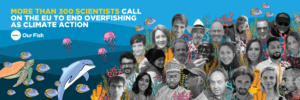Looking for the scientist statement, and how to sign it? Please go here.
Brussels, 10 September 2020:- “End overfishing” – that’s the message delivered to EU Commissioner for the Environment, Oceans and Fisheries, Virginijus Sinkevičius this week, as part of a statement signed by more than 300 scientists calling for action by the European Commission, European Parliament and EU member states to end overfishing “as an urgent and necessary response to the biodiversity and climate crises”.
The scientists are urging the EU to set fishing limits within scientific advice, and recognise that “ecosystem-based fisheries management is critical to the health of the ocean and its capacity to respond to climate change” [1,2].
The signatures will also be delivered to EU Member State fisheries ministers, before annual fishing limits are agreed for 2021, and to Members of the EU Parliament who are preparing their response to the EU 2030 Biodiversity Strategy [3].
The statement, signed by leading voices in the marine science field, including Professor Carlos M. Duarte, Professor Hans-Otto Pörtner, Dr Valérie Masson-Delmotte, Professor Rashid Sumaila, Dr Ute Jacob, Dr Jean-Baptiste Jouffray, Professor Didier Gascuel, Dr Rainer Fröse, Professor Alex Rogers, Professor Victoria Reyes-Garcia, Dr Sandra Cassotta, Professor Stiig Markager, and Professor Daniel Pauly, was delivered this week to EU Commissioner Virginijus Sinkevičius by the Our Fish campaign.
“Overfishing and bycatch are the largest drivers of biodiversity loss in the ocean”, said Professor Alex Rogers, Science Director at Rev Ocean. “We need a healthy and productive ocean, and ending overfishing is key. This is especially the case when faced with the effects of climate disruption, which affects the whole ocean, including fish stocks themselves. As a scientist, I am calling on the EU to recognise that ecosystem-based fisheries management is critical to the health of the ocean and its capacity to respond to climate change. It is also vital for human health, including that of future generations”.
“Overfishing means taking more fish out of the water than can grow back. To be honest, that’s pretty stupid. Because then the stocks shrink, and shrunken small stocks can only support small catches. So that makes no sense at all; it doesn’t help the fishermen, it doesn’t help the fish, it doesn’t help anyone. The whole thing also has an impact on the climate; fish stocks that are too small cannot fulfill their role in the ecosystem. If the ecosystem does not function properly, it cannot breathe properly and cannot absorb CO2 properly”, said Dr. Rainer Fröse, GEOMAR – Helmholtz centre for ocean research Kiel, Germany.
“The science is clear – now the EU must ensure that a healthy ocean is central to its response to the nature and climate crisis – and that means finally putting an end to overfishing”, said Rebecca Hubbard, Programme Director of Our Fish. “Just like with our own health, if we continue to batter the ocean with overfishing, the whole system will weaken further, until it can no longer provide us with the life-support we need it for – oxygen, climate regulation, food and jobs. The EU must stop dragging its feet and take this clear and decisive action now, before it’s too late”, concluded Hubbard.
ENDS
Note: A number of the signatories, from several countries, are available to speak to media – please contact press@our.fish for further details.
Contact:
Dave Walsh, Our Fish Communications Advisor, +34 691 826 764, dave@our.fish
Notes:
[1] Scientist Statement of Support: Ending Overfishing Is Climate Action https://our.fish/news/ending-overfishing-is-climate-action-scientist-statement-of-support/
[2] Definition of ecosystem-based fisheries management:
As opposed to traditional fisheries management, which focuses on managing single species only, Ecosystem-Based Fisheries Management (EBFM) is part of the broader ecosystem-based management approach that addresses all environmental, ecological, and anthropogenic (including fisheries) impacts on an ecosystem and takes into account the interconnectedness and interdependence of various components of an ecosystem. https://www.sciencedirect.com/topics/earth-and-planetary-sciences/ecosystem-based-fisheries-management
[3] EU Biodiversity Strategy for 2030
https://ec.europa.eu/environment/nature/biodiversity/strategy/index_en.htm
About Our Fish
Our Fish is working to end overfishing and restore a healthy ocean ecosystem. By collaborating with others, and deploying robust evidence, we are calling for an end to overfishing as a critical and significant action to address the biodiversity and climate crisis
Website: https://our.fish
Follow Our Fish on Twitter: @our_fish


